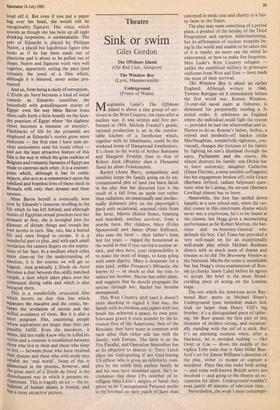Cinema
Belgian tragedy
Peter Ackroyd
LIEtoile du Nord (PG', Odeon Kensington)
Q ince most of this film is set in a Belgian boarding house, it may not be for those with fixed prejudices about that country — Belgium being popularly regarded as the Pimlico of Europe. But this particular boarding house harbours a murderer, and L'Etoile du Nord is in certain respects a 'thriller'. It actually opens in Egypt — the year is 1934— and at first seems to run true to the type of French murder mystery: a great many interiors of hotels, railway car- riages and bars, all filmed with the nostalgic archness which Thirties decor seems to en- courage. It is a film about greed and faithlessness, secrets betrayed and hopes unfulfilled: what could be more ap- propriate for the kind of icy pathos which French film-makers are so adept at bringing to even the most vapid scenes? All we need is Edith Piaf singing faintly in the background.
Eduardo, a Frenchman who has lived in Egypt as the platonic companion of a famous Egyptian chanteuse, returns to Europe after her death. He clutches a ring which she gave him in her last hours, but when he tries to sell it he discovers that it is a fake. For reasons too complicated to ex- plain here (and in fact they are never made entirely clear), he murders a rich Egyptian philanderer and takes refuge in the famous boarding house. Here, in the mode of Shadow of a Doubt, he charms his fellow lodgers and professes disinterest as they read out the latest news on the murder which he has committed. This is where the fun begins, since Simone Signoret plays the landlady, Mme Baron.
Signoret hardly needs to act any more — the face does it for her; it has that peculiar lustre which is possessed by those actresses who have lived in that feature rather than lived off it. But even if you put a paper bag over her head, she would still be recognisably Signoret. Her voice, which, sounds as though she has been up all night drinking turpentine, is unmistakable. The part of Eduardo is played by Philippe Noiret, a placid but lugubrious figure who looks as if he has been made out of' plasticine and is about to be pulled out of shape. Noiret and Signoret work very well together, apparently setting the pace (and certainly the tone) of a film which, although it is leisured, never seems pro- tracted.
And so, from being a study of corruption,
L'Etoile du Nord becomes a kind of social comedy as Eduardo transfixes the
household with grandiloquent stories of
Egypt: even the way Mme Baron irons shirts calls forth a little homily on the laun-
dry practices of Egypt where 'the slightest chore becomes a moment of eternity'. Flashbacks of life by the pyramids are employed as Eduardo's stories grow more elaborate — the first time I have seen an- cient monuments used for ironic effect — and not the least attractive feature of this film is the way in which the grim realities of Belgium and romantic fantasies of Egypt are made to contrast each other. It is a counter- point which, although it has its comic aspects, also acts as a commentary upon the subdued and hopeless lives of those stuck in Brussels with only their dreams and their sprouts.
Mme Baron herself is eventually won over by Eduardo's innocent revelling in the life which he has left behind; and although stories of Egyptian sexual practices turn her stomach at first, she is inveigled into the glamour of distant things and reveals her own secrets in turn. She, too, has a buried life and once longed to escape. It is a wonderful part to play, and with each small revelation the camera lingers on the expres- sions of her face. In a medium which relies
upon close-up for the understanding of emotion, it is the nearest we will get to tragedy. And gradually L'Etoile du Nord
becomes a duel between this oddly matched couple, a duct which takes place over the communal dining table and which is also betrayed there.
This is a wonderfully structured film Which hovers on that thin line which separates the macabre and the comic, be- tween the revelation of secrets and the Skilful avoidance of them. But it is also a Most poignant film, examining people Whose aspirations are larger than they can Possibly fulfill. Even the murderer, it seems, did not really know why he killed his victim and a contrast is established between those who live to sleep and those who sleep
to live — between those who have retained
their dreams and those who with steely eyes Inhabit the 'real world'. None of this is glamorised in the process, however, and
the great merit of L'Etoile du Nord is the disenchanted way in which it presents en- chantment. This is tragedy on ice — the ex- halation of human misery is frosted, and has a most attractive pattern.







































 Previous page
Previous page